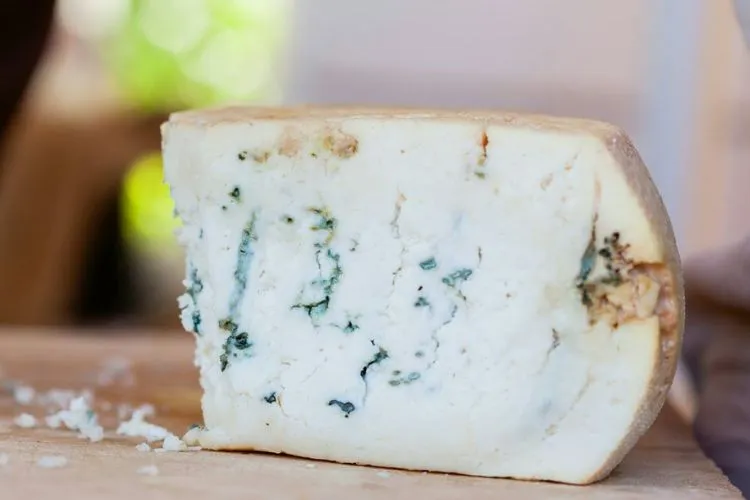As loving pet owners, we constantly seek ways to pamper and care for our furry friends, often extending our own dietary preferences to them.
So, can dogs eat blue cheese?
It’s a common question, and it baffles many dog owners is whether it’s safe to share foods like blue cheese with their dogs.
This article delves into the risks and necessary precautions regarding feeding blue cheese to dogs, providing comprehensive insights to ensure your canine companion remains healthy and happy.

🐾 Can Dogs Eat Blue Cheese?
To answer briefly, no, it is not recommended for dogs to eat blue cheese. This stance is supported by veterinary science due to the presence of substances in blue cheese that can be harmful to dogs.
Let’s explore why this seemingly harmless treat for humans is not a safe choice for our four-legged friends.
🐾 Health Effects of Blue Cheese on Dogs
Blue cheese contains a substance known as Roquefortine C, a by-product of the Penicillium roqueforti mold used in its production.
While this compound is not harmful to humans in the quantities present in blue cheese, it can be toxic to dogs. Symptoms of Roquefortine C poisoning in dogs include vomiting, diarrhea, high temperatures, seizures, and even more severe neurological effects.

Aside from the specific toxicity of Roquefortine C, blue cheese poses other health risks to dogs. Its high fat content can lead to obesity and a series of digestive issues, ranging from mild discomfort to pancreatitis, an inflammation of the pancreas that can be life-threatening.
Furthermore, the excessive salt content in blue cheese can dehydrate dogs and, in extreme cases, lead to sodium ion poisoning.
🐾 What if Your Dog Eats Blue Cheese?
If your dog consumes blue cheese, it’s important not to panic. The first step is to monitor them closely for any signs of distress, such as vomiting, lethargy, or abnormal behavior.
Although a small amount might not cause immediate harm, it’s crucial to consult with your veterinarian, especially if any symptoms develop. They may advise you on specific steps to take or suggest bringing your dog in for a check-up.
🐾 Alternatives to Blue Cheese for Dogs
Thankfully, there are safer cheese options and healthy alternatives for dog owners who wish to treat their pets. Cheeses like cottage cheese and mozzarella are lower in fat and salt, making them more suitable for dogs in moderation.
Additionally, there are a variety of dog-friendly fruits and vegetables, such as carrots and apples, that make excellent nutritious snacks.
🐾 Effects of Dairy on Dogs in General
Dogs, like many mammals, are primarily lactose intolerant as adults. This intolerance stems from the reduced production of lactase, the enzyme responsible for breaking down lactose in milk.

While many puppies can digest their mother’s milk due to higher lactase levels, these typically decrease as they wean and mature, leading to varying degrees of lactose intolerance.
Lactose Intolerance in Dogs
- Symptoms: Lactose intolerance in dogs can manifest as gastrointestinal discomfort, diarrhea, vomiting, and bloating after consuming dairy products.
- Dairy Variability: The effects of dairy on dogs can vary depending on the type and amount of dairy consumed. For example, hard cheeses and plain yogurts contain less lactose than milk, possibly making them more tolerable in small amounts.
- General Advice: Despite the potential for tolerance in small quantities, it is generally recommended to avoid giving dogs dairy products. The varying degree of lactose intolerance among dogs means that some can be more adversely affected than others.
Beyond Lactose: Other Concerns with Dairy
While lactose intolerance is a significant factor, it’s not the only concern with feeding dairy to dogs. Dairy products can be high in fat, leading to an increased risk of obesity and pancreatitis in dogs.
Furthermore, some cheeses contain substances that can be harmful in other ways; for instance, the mold in certain blue cheeses produces Roquefortine C, which can be toxic to dogs.
Understanding the evolutionary and physiological differences between canine and human digestive systems is crucial in ensuring the safety and health of dogs.
While some foods that are innocuous or even healthy for humans can be harmful to our canine companions, the key to canine nutrition lies in tailoring their diet to match their digestive capabilities, including cautious consideration of dairy products due to the common issue of lactose intolerance among dogs.
🐾 Frequently Asked Questions (FAQs)
Monitor your dog for any signs of distress, and contact your veterinarian for advice. It’s important to know the amount consumed to assess potential risks accurately.
While a small one-time ingestion might not cause severe issues, it’s always better to err on the side of caution and avoid feeding blue cheese to dogs.
Yes, cheeses such as cottage cheese and mozzarella are safer for dogs in small amounts due to their lower fat and salt content.
Store potentially harmful foods out of reach and be mindful of what you’re sharing with your dog. Educating yourself and your family on safe versus toxic foods for dogs is key.
Conclusion:
In conclusion, while the idea of sharing a piece of blue cheese with your dog might stem from a place of love, it’s essential to understand the potential risks involved.
By educating ourselves and taking preventive measures, we can ensure our canine companions enjoy a diet that’s safe, nutritious, and appropriate.
Remember, when in doubt, it’s always best to consult with a veterinarian who can provide personalized advice tailored to your dog’s dietary needs. Let’s keep our furry family members safe, healthy, and happy by making informed choices about their diet.
